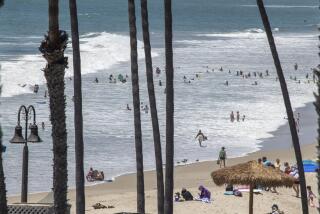Curfew Laws and Their Enforcement Vary
- Share via
Los Angeles and many other Southern California cities have enacted curfew ordinances, but most are generally enforced only when police receive complaints.
The Los Angeles Police Department arrested only 110 juveniles for curfew violations in 1989, while Long Beach and Compton officers have been only slightly more active.
Commander Tony Van Countren said the Long Beach Police Department recently started periodic roundups of curfew violators in response to complaints about loud parties or liquor sales to minors. The first sweep in October netted 18 alleged curfew breakers in six hours, he said.
The Compton Police Department takes in a minimum of 10 alleged curfew breakers each weekend, said Sgt. Danny Sneed, but most are arrested under anti-loitering laws that are drawn more precisely than curfew regulations. Typical curfew ordinances in this area prohibit youths under 18 from being on the street from 10 or 11 p.m. to sunrise.
In recent years, several lawsuits have challenged the ordinances as overly broad, and laws often have been amended to provide exceptions. For the most part, juveniles are allowed to be out after hours if they are going to and from work, a public meeting or recreational activity, or are on an emergency errand for their parents or guardians.
Nevertheless, a law professor who conducted a study of curfew ordinances when she worked at the Southern California chapter of the American Civil Liberties Union says the ordinances still present constitutional problems.
“One of the problems is that they are a set-up for selective enforcement,” says Joan Howarth, a professor at Golden Gate Law School in San Francisco.
“In the 1950s they were used aggressively against so-called juvenile delinquents. In the early 1960s there was aggressive enforcement of curfew laws against hippies in Hollywood. And in recent years we saw aggressive enforcement of curfew in Westwood at the same time that there were many more black and Chicano people coming there. . . .
“When we conducted our study, we found parents who said . . . part of educating and raising children is to allow them increased responsibility when they earn it, and the automatic, age-based curfew by the government does not take that into account.”
Los Angeles police dusted off the city’s 1902 curfew law in 1985 after Westwood merchants complained that their businesses suffered from sidewalks jammed with teen-agers. More than two dozen young people were detained in a two-month period.
In the same year, Huntington Park police detained about 60 young people during a weekend crackdown aimed at graffiti and vandalism, while Newport Beach police used the city’s 11 p.m. curfew to disperse about a thousand young people crowding the Balboa Peninsula on Friday and Saturday nights.
Los Angeles police also instituted a crackdown in high-crime areas of South Los Angeles in 1987 and in Eagle Rock, Mt. Washington and Silver Lake the following year.
Carson and Modesto are among other cities which have enacted curfews.
“I don’t think it’s used a lot,” said Larry Olson, director of public safety for the city of Carson.
“One reason is it takes officers off the streets and out of service for so long while they in essence baby-sit a youngster until his parents can be found and come down and pick him up.”
SOUTHLAND CURFEWS
Carson: 10 p.m. to sunrise
Compton: 10 p.m. to 5 a.m.
Los Angeles: 10 p.m. to sunrise
Long Beach: 10 p.m. to sunrise
Modesto: 11 p.m. to 5 a.m.
Newport Beach: 10 p.m. to 6 a.m.
More to Read
Sign up for Essential California
The most important California stories and recommendations in your inbox every morning.
You may occasionally receive promotional content from the Los Angeles Times.













